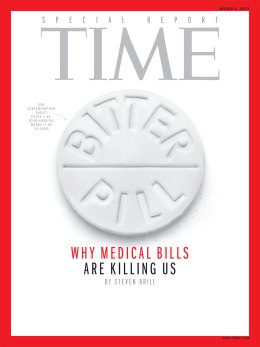 Time Magazine’s cover story this week is an incredible read and one we highly recommend. Steven Brill’s “Bitter Pill: Why Medical Bills are Killing Us” provides a remarkably in depth look at our American health care system including Medicare. Using many personal case studies, Brill breaks down and describes the economic devastation being reaped by our for profit medical industrial complex.
Time Magazine’s cover story this week is an incredible read and one we highly recommend. Steven Brill’s “Bitter Pill: Why Medical Bills are Killing Us” provides a remarkably in depth look at our American health care system including Medicare. Using many personal case studies, Brill breaks down and describes the economic devastation being reaped by our for profit medical industrial complex.
As we’ve said here repeatedly, America doesn’t face a Medicare crisis — we face a national health care crisis. Rather than targeting Medicare for cuts we should be using it as the model to improve out health care system nationwide. As Brill reports:
“Unless you are protected by Medicare, the health care market is not a market at all. It’s a crapshoot. They are powerless buyers in a seller’s market where the only sure thing is the profit of the sellers.”
Consider Time’s example of Susan S. She was 64, one year away from qualifying for Medicare, when she went to the hospital with chest pains. Her bill for 3 hours of tests and a false alarm was $21,000. If she had Medicare she would have paid less than $500. Compare her costs:

Time’s survey of this same hospital found that in 2010 its total charges were 11 times its actual costs. And that’s not unusual in our current private profit and even non-profit health care system.
Not only does Medicare manage these outrages costs better than the private market, Medicare’s administrative costs are two-thirds of 1% or less than $3.80 per claim. Private Insurers administrative costs run much higher. Brill reports Aetna’s for example, run 29% or $30 for each claim.
However, Medicare isn’t immune from the skyrocketing costs that are burdening our economy. Brill points out that Congress has tied Medicare’s hands in many instances forcing the more efficient Medicare program to perform like the less efficient private market:
Our laws do more than prevent the government from restraining prices for drugs the way other countries do. Federal law also restricts the biggest single buyer — Medicare — from even trying to negotiate drug prices. As a perpetual gift to the pharmaceutical companies (and an acceptance of their argument that completely unrestrained prices and profit are necessary to fund the risk taking of research and development), Congress has continually prohibited the Centers for Medicare and Medicaid Services (CMS) of the Department of Health and Human Services from negotiating prices with drugmakers. Instead, Medicare simply has to determine that average sales price and add 6% to it.
Similarly, when Congress passed Part D of Medicare in 2003, giving seniors coverage for prescription drugs, Congress prohibited Medicare from negotiating.
Nor can Medicare get involved in deciding that a drug may be a waste of money. In medical circles, this is known as the comparative-effectiveness debate, which nearly derailed the entire Obamacare effort in 2009.
The health care industrial complex spends more than three times what the military industrial complex spends for Washington lobbying. Is it any wonder why so many in Congress have chosen to ignore the true system wide health care problem in favor of targeting Medicare for benefit cuts, arbitrary caps, cost-shifting, means-testing and privatization.
They know what the core problem is — lopsided pricing and outsize profits in a market that doesn’t work.
In spite of this, Congress appears ready to protect that broken health care market that is wrecking our economy in favor of targeting the program that works for cuts — all in the name of deficit reduction. Cutting benefits to seniors in Medicare not only ignores the real challenges we face as a nation but it also threatens the health security of millions of Americans.


